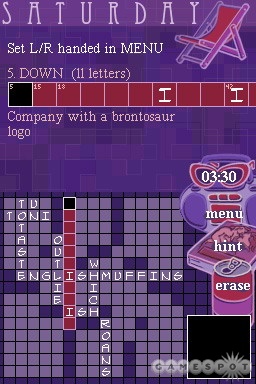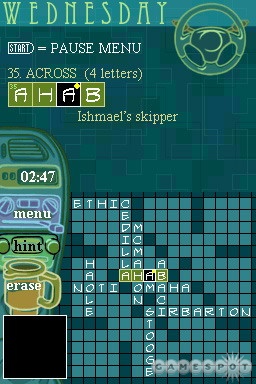One of the things the New York Times newspaper is famous for is its daily crossword puzzle, which employs clever clues and quirky themes to test a person's ability to recall knowledge about a vast array of topics including world history, science, literature, the arts, and pop culture. Puzzles increase in difficulty as the week progresses. Monday's puzzle tends to provide straightforward hints and simple puns, whereas Sunday's grid provides cryptic clues about esoteric words and phrases that even well-traveled bookworms will have trouble coming up with. Majesco's The New York Times Crosswords lets you rack your brain against 1,000 authentic New York Times crosswords without having to lug around a bunch of newspapers or pencils.

You don't have to worry about ink staining your fingers anymore, or transforming the page into a smudged mess from constantly erasing your mistakes. Puzzles are shown on the system's touch screen, and letters are either typed via a quick, easy-to-use keyboard on the touch screen, or drawn directly onto the touch screen with the stylus. A split second after you draw a letter in the input area, the letter will magically appear in the highlighted box on the puzzle grid. The software's handwriting recognition is very accurate and can handle print or cursive styles in uppercase or lowercase form. You'll notice some clashes early on--for example, confusing uppercase G's and B's--but these clashes will become less frequent over time. If you make a mistake, all you have to do is draw a dash in the input box or press the erase button and the offending letter will be removed. It's just like filling out a paper crossword, except that you're free to hazard guesses and change letters without dirtying up the puzzle. The presentation won't amaze you, but the crisp lettering, soft background colors, and soothing music create a pleasant atmosphere that makes a few hours feel like only a few minutes.
All around, the controls and features make a strong argument for ditching traditional crosswords in favor of ones on handhelds like the Nintendo DS. The touch screen and buttons easily let you select menu options, move to different sections of the puzzle, zoom the view in or out, and request hints. Every press of the hint button will reveal another letter of the currently highlighted word. When you've filled in the last letter box, the software will show you the whole puzzle, circle any incorrect letters, and give you the opportunity to correct your mistakes. You can choose to have the system grade your ability to solve puzzles. If you opt to do so, time and the use of hints count against your grade. The system keeps track of which puzzles you've completed and the grades you've received. A built-in save function also lets you store a puzzle in progress, shut the system off, and come back to it later.
Puzzles generally take anywhere from 30 minutes to two hours to complete. When you multiply that by roughly 1,000 puzzles, that's some serious play time. Of course, you could buy a few crossword anthology books containing the same number of puzzles for half the price of this game card. But then you'd have to haul around a bunch of books and pencils, and you wouldn't be able to erase your mistakes as easily. Different play modes let you pick a quick puzzle at random, select specific puzzles from a calendar-style list, or attempt a week's worth of puzzles in one shot. There's also a multiplayer mode that lets you beam puzzles to as many as three other players from only a single game card. One setting allows you and your friends to complete the puzzle cooperatively, while the other initiates a competition to see who can fill in the most answers before time runs out. Some way to download additional puzzles from the Internet would have been nice, but that's not a huge problem since it'll take you at least a few months to get through the ones that are included on the game card--and that's assuming you pour your life into doing so.

Another thing to keep in mind is that these are some of the most challenging crosswords around. The New York Times is known for its hard news coverage of politics, scientific studies, and the economy, as well as its coverage of softer topics such as literature, entertainment, and sports--not just from the United States, but from around the globe. The editors of the daily crossword assume solvers read the paper every day, which means the puzzle tends to be geared toward highly educated people that have a good sense of the world and its history. Clues often involve clever wordplays and sayings, while answers frequently turn out to be foreign words, abbreviations, and multiword phrases. A typical Monday clue asks for the capital of South Korea (Seoul). One Thursday puzzle wants you to write the name of the monster confronted by Hercules during his second labor (Hydra). The clue to 77-Down in the puzzle for Sunday, May 22, in the second year cryptically asks, "Iliad: The Movie?" From that you're supposed to remember that The Iliad took place around Troy and come up with the two-word pun "Troy Story." If you have a good measure of life experience and knowledge of the world and culture, you should fare fine just as long as you don't mind occasionally asking a friend for help or making use of the hint function. However, if you're still in grade school, didn't pay attention when you were in school, or don't keep up with current events, the majority of these clues and puzzles are simply going to be beyond your reach.
Because the majority of puzzles require a wealth of knowledge to complete, this game isn't appropriate for younger players or people with a limited knowledge of the world and its goings-on. Bearing that disclaimer in mind, you should definitely pick up The New York Times Crosswords for the Nintendo DS if you enjoy solving crosswords and feel that your brain has amassed a healthy understanding of current events and culture during your years on this planet. Furthermore, people who don't normally like solving pen-and-paper crosswords may just find that they like how the touch screen makes it easy to jot down letters and erase mistakes.